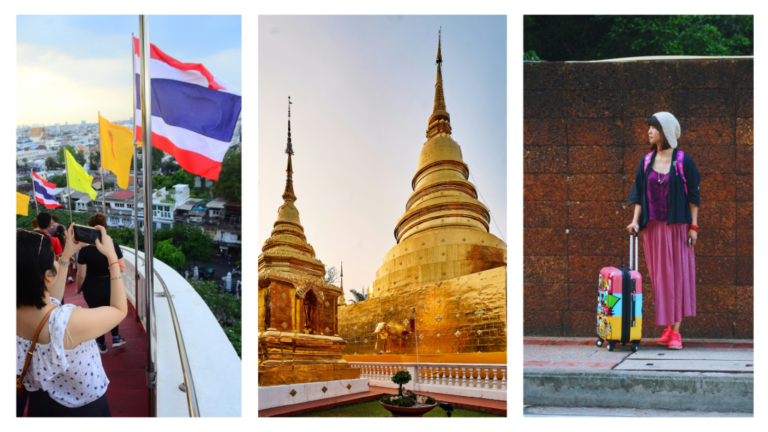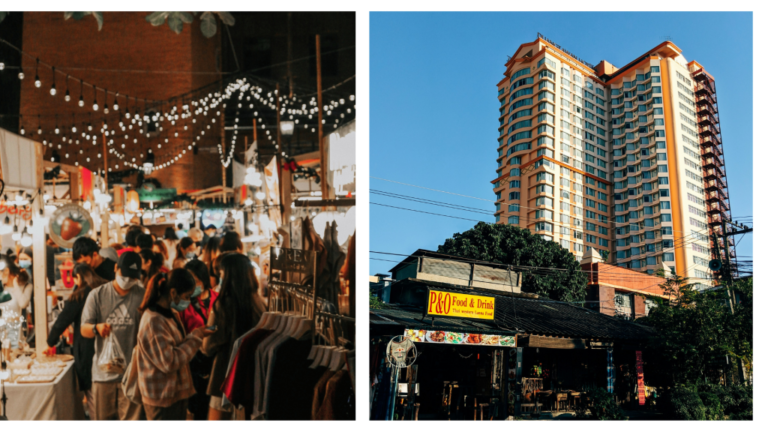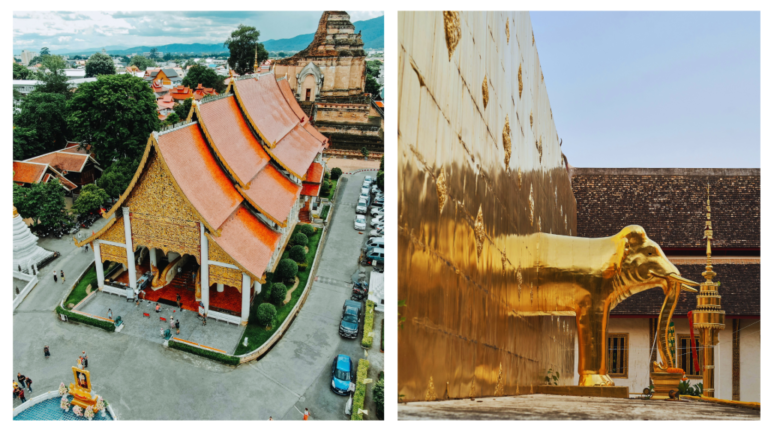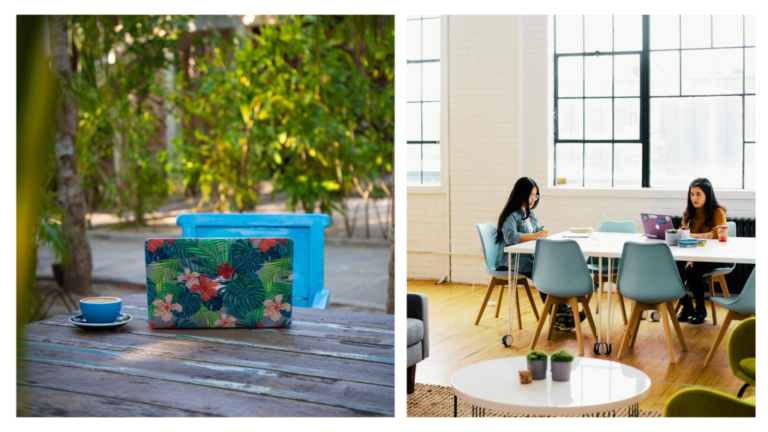Where to stay in Chiang Mai as a digital nomad
Your Thailand adventure starts here! Discover where to stay in Chiang Mai and find the perfect spot for you as a digital nomad.
Chiang Mai, the charming city in northern Thailand, has become a top destination for digital nomads worldwide. With a low cost of living between $500 (€470) and $1,500 (€1,400) per month, it offers the perfect balance between work and exploration.
Stay with the Holafly team to discover where to stay in Chiang Mai and the best options for the digital nomad lifestyle in this destination. There’s something for everyone!
Accommodation options for digital nomads in Chiang Mai
With stunning temples such as Wat Phra That Doi Suthep, the Old Town, and authentic Thai cuisine, plus a vibrant café and lodging scene that fosters creativity and interaction, Chiang Mai has become a paradise for digital nomads from many professional backgrounds.
Whatever your needs and budget, we’ll help you plan where to stay in Chiang Mai. Here are the most common types:
Coliving spaces
These shared spaces are popular among digital nomads because they combine a community environment that encourages interaction and networking.
In colivings, you can rent a room or bed while enjoying facilities like high-speed internet and shared work areas. They also organise social activities and workshops, helping you make friends and build a professional network.
Advantages of staying in a coliving in Chiang Mai
- Community and Networking: Colivings foster an environment of integration where you can meet other digital nomads. This interaction opens up opportunities for professional collaborations and the exchange of ideas.
- Inspiring workspaces: Designed with ergonomic, bright work areas and reliable internet, they encourage productivity and focus. High-speed internet connection is a standard feature in these places.
- Activities and Events: Colivings often organise social activities, workshops, and recreational events. These opportunities to socialise and learn enrich the experience and help create a sense of community.
- Flexible contracts: Many offer short- or long term stays, ideal for digital nomads needing adaptable arrangements.
- Included services: Cleaning, laundry, and access to common areas simplify daily life and add convenience.
- Strategic locations: Usually in central areas close to cafés, restaurants, and coworking spaces.
- Multicultural atmosphere: You’ll meet people from many nations and cultures.
- Predictable costs: Rent often includes utilities, making monthly budgeting easier and avoiding surprise bills.

Hostels and hotels
Hostels and hotels are very popular among digital nomads in Chiang Mai. With more remote professionals arriving each year, these accommodations have adapted their facilities to meet specific traveller needs.
Advantages of staying in hotels and hostels
- Cost-effectiveness: Hostels and hotels suit different budgets. Hostels are cheaper, while hotels often offer deals and packages.
- Social atmosphere: Hostels promote guest interaction and friendship building; some hotels also host social events.
- Common areas: Many hostels have shared spaces for working or relaxing, encouraging collaboration. Hotels often feature comfortable lounges.
- Flexibility: Both allow short stays, perfect for digital nomads adjusting travel plans without long term commitments.
Apartments and studios
For those valuing privacy and flexibility, renting an apartment or studio is an excellent choice. Chiang Mai offers many online listings, letting digital nomads choose by location and style.
Advantages of renting an apartment in Chiang Mai
- Privacy: Apartments and studios provide private space where you can concentrate on work without distractions.
- Personal comforts: Most have kitchens so you can cook, save money, and enjoy local ingredients. This saves you money and gives you the opportunity to enjoy and experiment with ingredients from the local cuisine.
- Rental flexibility: Many landlords offer short- and long term options to match your plans.
- Extra space: Apartments give more room for working, relaxing, or storage than a coliving room.
- Convenient location: Many are in well-connected neighbourhoods near urban life.
- Peaceful environment: Enjoy a calm setting that improves focus and rest while working remotely.

Villas and houses
If you prefer a larger, more comfortable space, renting a villa or house might be ideal. These options offer extra amenities and room, perfect for families or work teams.
Advantages of staying in houses or villas in Chiang Mai
- Spacious areas: Separate zones for working, resting, and socialising.
- Full amenities: Usually include complete kitchens, gardens, and often a pool for a relaxed stay.
- Total privacy: A house or villa offers independence and personal space that colivings can’t match. This is perfect for those who value their independence and desire a personal space.
- Quiet setting: Many are in peaceful districts or on the outskirts, away from urban noise.
- Group flexibility: Perfect for friends or families—often cheaper than several hotel rooms.
- Team-friendly: Great for workgroups wanting a creative and informal environment.
During your trip, get high-speed internet and unlimited data coverage with the Holafly eSIM for Thailand in Chiang Mai and other cities. You no longer need a plastic SIM or roaming service to stay connected. Our eSIM technology has everything in one!

Important: If you are a frequent traveler and want to stay connected without worrying about expensive roaming or looking for a new SIM at every destination, Holafly’s subscription plans are for you. With a single eSIM, enjoy internet in more than 170 countries for a fixed price and no surprises on your bill. Travel without limits and connect easily and securely! 🚀🌍

Best areas to live in Chiang Mai as a digital nomad
Nimmanhaemin Road
Nimmanhaemin Road, or Nimman, is the most popular area among digital nomads, known for its modern and artistic atmosphere. The district is full of cosy cafés, unique boutiques, and art galleries that attract a creative community.
Life here is lively, with a constant flow of cultural events and chances to socialise. The area is well-connected to the rest of Chiang Mai, and many places are within walking or cycling distance.
This neighbourhood offers a wide range of accommodation options for digital nomads. Among the most popular colivings, Hub53 stands out, located near the Maya Lifestyle Shopping Centre, with great prices starting from around $200 (€188) per month for a private room.
Hotels such as Alexa Hostel offer shared bathrooms and dorm beds starting at around $230 (€200) per month. The Common also provides affordable and comfortable stays at similar prices.
For those preferring more privacy, apartments start from about $290 (€250) per month, while villas or houses for families or teams can cost up to $500 (€430) monthly.
When it comes to cafés and public spaces for remote work, Nimmanhaemin Road is famous for its excellent selection. Ristr8to is known for its speciality coffee and calm atmosphere, ideal for working. Hub53 also offers coworking spaces tailored to digital nomads. Where to stay in Chiang Mai as a digital nomad

Old Town Chiang Mai
Old Town Chiang Mai is a cultural gem filled with ancient temples, historic walls, and lively local markets. The area’s calm environment lets you enjoy the city’s heritage while staying close to modern comforts.
The Old Town is easy to explore on foot, with most attractions, such as temples and markets, only minutes away.
If you’re wondering where to stay in Chiang Mai to fully experience Thai culture, Old Town is perfect. You’ll find apartments and houses from about $200 (€188) per month, and larger options with more amenities from around $300 (€258) monthly. Platforms like Airbnb and Facebook expat groups are great for finding rentals.
Among affordable hotel choices, Raming Lodge stands out. This charming place offers comfortable rooms and a prime location in the Old Town, with nightly rates from around $30 (€26).
The Barn is a café known for its peaceful atmosphere with open spaces and excellent service, making it a very welcoming place to work remotely while enjoying the menu.

Thanon Santitham
Santitham is a less touristy neighbourhood in Chiang Mai that offers an authentic local living experience. It’s perfect for those seeking a quieter, more welcoming atmosphere away from the busy tourist zones.
Rent in Santitham is very affordable, providing an excellent balance between comfort and cost. Apartments start at around $150 (€129) per month, while hotels and hostels like Lullaby and Baan Dalah offer private or shared rooms with workspace areas from about $10 (€9) per night.
Prices for colivings vary, but in Santitham, shared beds start at around $250 (€216) per month, including internet and work areas.
On Booking.com, you’ll find apartments and houses with excellent ratings at good monthly rates. Houses usually range from $450 (€388) to $900 (€774), depending on their location and facilities.
Although Santitham is slightly further from the centre, it’s well connected by public transport. You can easily cycle or take local buses to reach other parts of the city.
Santitham also features several cafés and public spaces ideal for remote work. One highlight is Mac Café, where you can enjoy great Thai food, rent, buy, or repair Mac devices. Think Park offers a livelier setting with a large food court and tables for checking emails or working outdoors.

Comparison of where to stay in Chiang Mai
| Area | Type of Accommodation | Options | Approximate price | Cafés and Coworking Spaces |
| Nimmanhaemin | Coliving spaces | Hub53: | From $200/month (€184) | Ristr8to, Hub53 |
| Hotels | Alexa Hostel, The Common | From $230/month (€211) | ||
| Apartments | From $290/month (€266) | |||
| Villas/Houses | Up to $500/month (€458) | |||
| Old Town | Apartments | From $200/month (€184) | The Barn | |
| Hotels | Raming Lodge | $30/night (€27) | ||
| $30/night (€27) | ||||
| Santitham | Coliving spaces | From $250/month (€229) | Think Park, Mac Café | |
| Hotels/Hostels | Lullaby, Baan Dalah | From $10/night (€9) | ||
| Apartments | From $150/month (€138) | |||
| Houses | $450-900/month (€388-774) |
Where to stay and work in Chiang Mai as a digital nomad
You’re now ready to start planning where to stay in Chiang Mai! In short, if you want a modern, social, and creative environment, Nimmanhaemin is your best option. If you prefer a deeper cultural experience, Old Town offers peaceful surroundings and direct access to temples and markets. On the other hand, Santitham is affordable, authentic, and calm, though slightly farther from tourist areas.Where to stay in Chiang Mai as a digital nomad?
Discover what to pack and everything essential for living and working in this Asian destination in our Thailand Digital Nomad Guide. Have a good trip!
Frequently asked questions about where to stay in Chiang Mai
Nimmanhaemin is the most popular area for its modern and artistic vibe, ideal for socialising and working in cafés. Old Town offers rich culture, while Santitham is affordable and peaceful.
It depends on your lifestyle. Colivings are perfect for networking. Apartments offer privacy and flexibility, while hostels suit smaller budgets and social travellers.
The cost of living in Chiang Mai ranges from $500 (€458) to $1,500 (€1,376) monthly, depending on your accommodation and lifestyle.
Yes, many cafés in Chiang Mai, especially in Nimman and Old Town, welcome digital nomads. They offer great Wi-Fi and relaxed atmospheres.
Yes, you’ll find plenty of options on platforms like Airbnb, Booking.com, and expat Facebook groups. Booking early is wise, especially in high season.
Colivings usually offer high-speed internet, cleaning, laundry, and access to shared areas. They make daily life easier for digital nomads.





 Language
Language 


















 No results found
No results found


